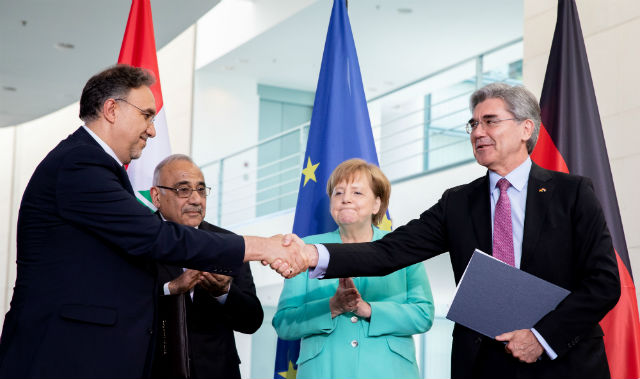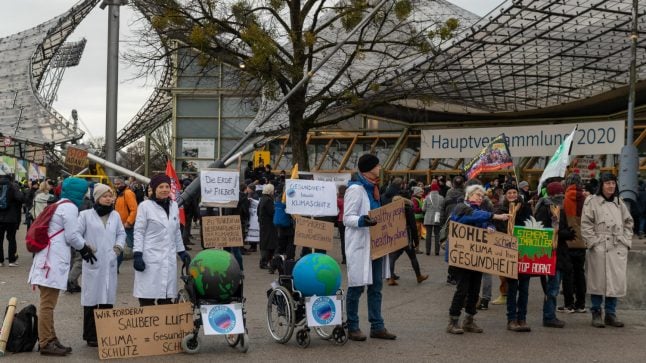SIEMENS
Siemens signs ‘roadmap’ deal on $14bn Iraq grid upgrade
German industrial conglomerate Siemens cleared a hurdle Tuesday in its race with US-based General Electric to rebuild Iraq's electricity grid, signing a "roadmap" at a Berlin meeting with top ministers.
Published: 1 May 2019 11:54 CEST

Iraqi energy minister Luay al-Khatteeb (l) shakes hand with Siemens chief executive Joe Kaeser after signing the deal. Photo: Kay Nietfeld/dpa
Chief executive Joe Kaeser and Iraq's electricity minister Luay al-Khateeb “signed an implementation agreement to kick off the actual execution of the roadmap” agreed last year, the Munich-based group said in a statement.
Under Tuesday's deal, Siemens secured contracts worth 700 million euros ($785 million) to build one power plant, upgrade 40 gas turbines and install substations and transformers “across Iraq”.
Speaking to journalists after meeting German Chancellor Angela Merkel, Iraqi Prime Minister Adel Abdul-Mahdi said the roadmap included around $14 billion of contracts in total that was “subject to competition” although “Siemens has big chances to secure a large share”.
Both Siemens and General Electric signed non-binding memorandums of understanding with the Iraqi government last year on rebuilding and repairing electricity infrastructure.
In a statement Tuesday evening, Iraq's electricity ministry said the deal would be implemented over four years, adding up to 11 MW of electricity to the grid.
“This deal represents the beginning of a strategic relationship between Germany and Iraq,” the statement said
But it appeared to leave the door open for amendments or similar agreements with other energy firms.
“Negotiations will continue over specific projects in the roadmap to improve the terms of the deal, including prices,” the ministry said. It said the agreement should not “impede the work of other serious companies or limit their opportunities to invest in Iraq's electricity sector.”
The ministry declined to comment on whether a similar deal with General Electric was still on the table, but it had previously indicated it would be willing to sign separate agreements with both companies.
Baghdad is under pressure — at home and abroad — to rebuild its energy grid. Protests over chronic power cuts regularly take place in Iraq, which suffers from insufficient capacity and infrastructure weakened by age and terrorist attacks in recent years by the Islamic State group.
Summer especially is a peak time for electricity usage as air condition units inside buildings battle near-unbearable outside temperatures of 50 degrees Celsius (122 Fahrenheit).
Meanwhile, the United States has urged Iraq's government to wean itself off the gas and electricity imports from neighbouring Iran that it regularly uses to plug the gaps.
Tehran has been under American sanctions since US President Donald Trump withdrew from a 2015 deal that eased the economic squeeze in exchange for Iran freezing its nuclear programme.
Url copied to clipboard!



 Please whitelist us to continue reading.
Please whitelist us to continue reading.
Member comments